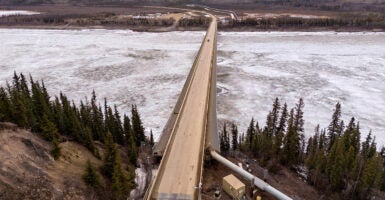Energy costs across the U.S. “would probably go down substantially” if the U.S. sharply increased mining and production of Alaska’s natural resources, according to Adam Crum, commissioner for the Alaska Department of Revenue.
Geographically, Alaska is by far the largest U.S. state at more than 663,000 square miles. It is also among the most natural resource-dense states in the nation.
Alaska became a state in 1959, and under its Statehood Act, it is “mandated that the mineral resources and the subsurface rights were collectivized by the state so that the state could actually collect the royalties and production taxes off of that to fund the government,” Crum explains on “The Daily Signal Podcast.”
While other states, such as Texas and North Dakota, can have “individual farmers who actually have mineral rights, nobody has that in Alaska,” he said, explaining that his state was “set up to be a resource-development state since inception.”
One of the world’s largest zinc and lead mines can be found in northwest Alaska and has now “been producing for over 40 years and has provided very extensive jobs,” according to Crum.
The mine has allowed the local indigenous population in northern Alaska to “not only have an economy to stay there, but you have this town now, it’s about 4,000, 5,000 people of primarily Inupiat Eskimos living up there. They get to benefit from this, and they can still get to live a subsistence lifestyle,” Crum explains.
Asked about the environmental effects of mining and drilling in Alaska, the revenue commissioner said life expectancy has increased in native communities where natural resources are being extracted as industry has strengthened local economies and increased the quality of life.
Crum joins “The Daily Signal Podcast” to discuss the vast natural resources Alaska has to offer.
Alaska House of Representatives Speaker Cathy Tilton joins the show after the conversation with Crum to discuss the greatest challenges facing America’s most northern state, and to share some of Alaska’s best-kept secrets.
Listen to both conversation on the podcast below:
































